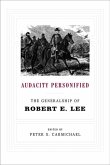"Nathaniel P. Banks (1816-1884) enjoyed a long and almost continuous career in public service -- election to the Massachusetts legislature, elevation to the governorship of the state, and ten terms of service in the U.S. Congress -- in spite of his lack of formal education, family connections, or personal fortune. Banks was known as a statesman of unsurpassed skill, a compelling speaker, and a politician with a bright future. Nevertheless, this "master of opportunities" fell short of his ultimate goal -- the White House -- and eventually squandered the promise of his early career. In Pretense of Glory, the first modern biography of Banks, James Hollandsworth reveals the complicated and contradictory nature of the man who called himself the "fighting politician". In 1858, Republican Speaker of the House Banks appeared to be a likely candidate for the highest office in the land. His differences with the Radical Republican delegation in his home state, however, had ireparably damaged his standing in the Party, and Abraham Lincoln received the coveted nomination. With the onset of the Civil War in January 1861, Banks enthusiastically joined the Union effort. Though lacking both training and experience, as a major general of volunteers Banks raised recruits, money, and morale. On the battle-field however, he proved to be a disaster. He lost hundreds of men during the Shenandoah Valley Campaign and, though completely routed, refused to admit defeat. He led hasty, ill-advised attacks at Port Hudson, resulting in 3,750 casualties among his men but only 600 for the Confederates. During the Red River campaign in 1864, Banks trounced the Confederates but then -- in a repeat of his earliertactical mistakes -- retreated when he should have attacked. This debacle led to the end of his military career. Banks resumed his political career, but his waffling between factions eventually destroyed his credibility. In this engrossing biography, Hollandsworth illuminates








